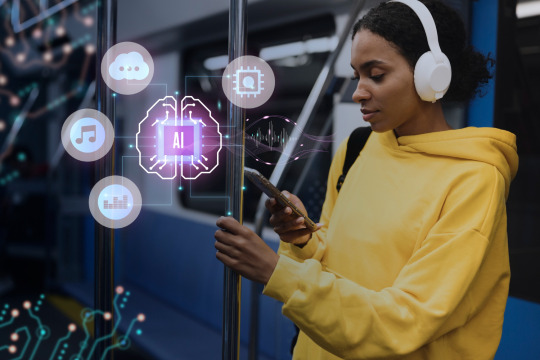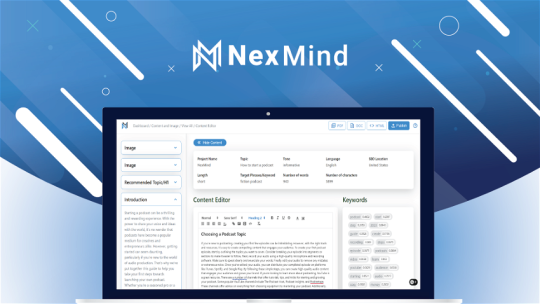#AI-driven Recommendations
Explore tagged Tumblr posts
Text
How Netflix Masters Personalization Through UX Design

Netflix has revolutionized the streaming industry by leveraging advanced UX design and personalization strategies to deliver a tailored viewing experience for each user. By analyzing user behavior and preferences, Netflix ensures that every interaction feels customized, enhancing user satisfaction and engagement.
For more articles please visit: https://pixelizes.com
Personalized Recommendations Through AI
At the heart of Netflix’s personalization is its sophisticated recommendation engine. This system analyzes various data points, including viewing history, search queries, and user ratings, to suggest content that aligns with individual tastes. By continuously learning from user interactions, the platform refines its suggestions, ensuring that users discover content that resonates with them.
Dynamic Artwork Personalization
Netflix goes beyond content recommendations by personalizing the artwork displayed for each title. Depending on a user’s viewing habits, the platform selects images that highlight aspects of a show or movie most likely to appeal to that use. For instance, a user who frequently watches romantic films might see a romantic scene as the thumbnail for a particular movie, while an action enthusiast might see a more dynamic image for the same title.
youtube
Explore Our Services
Enhanced Search Experience
Understanding that users often seek specific content, Netflix has optimized its search functionality to be more intuitive and personalized By incorporating user preferences and viewing history into search results, the platform ensures that users find relevant content quickly and efficiently.
Consistent Multi-Device Experience
Netflix ensures a seamless user experience across various devices, including smartphones, tablets, smart TVs, and desktop. This consistency allows users to transition between devices without losing their place in a show or movie, maintaining a cohesive and uninterrupted viewing experience.
Leveraging Behavioral Psychology
The platform employs behavioral psychology principles to enhance user engaged. Features like autoplay and infinite scroll are designed to keep users engaged by reducing decision fatigue and encouraging continuous viewing.
Continuous Improvement Through Feedback
Netflix actively incorporates user feedback to refine its planform. By analyzing user interactions and preferences, the platform continuously updates its algorithms and interface to better serve its audience, ensuring that the user experience evolves alongside user expectations.
Conclusion
Netflix’s mastery of personalization through UX design has set a benchmark in the streaming industry. By focusing on individual user preferences and behaviors, the platform delivers a tailored and engaging experience that keeps users commonly asking. As technology and user expectations evolve, Netflix’s commitment to personalization ensures it remains at the forefront of digital entertainment.
#Netflix UX design#personalization strategies#streaming platform user experience#AI-driven recommendations#dynamic artwork personalization#enhanced search functionality#multi-device streaming experience#behavioral psychology in UX#continuous user feedback integration#digital entertainment personalization#Youtube
1 note
·
View note
Text
The Role of Personalization in Online Retail

In the fast-paced world of online retail, personalization has become the game-changer that sets brands apart. It’s not just about making shopping easier; it’s about crafting a Personalized Shopping Experience that feels almost tailor-made. From dynamic content to AI-driven recommendations, personalization transforms how we shop, turning routine transactions into engaging experiences. Let’s delve into the multifaceted role of personalization in online retail and understand why it's more than just a trend.
Understanding E-Commerce Personalization
Personalization in e-commerce is the practice of using data to provide a tailored shopping experience for each user. But what does that really mean? Simply put, it involves customizing the online shopping journey based on individual preferences and behaviors.
What is E-Commerce Personalization?
E-commerce personalization involves tailoring website content, product recommendations, and marketing messages to fit the specific needs and preferences of each visitor. By analyzing user data and behavior, retailers can present a shopping experience that feels uniquely relevant to each individual.
For instance, imagine browsing an online shopping site for clothes. Instead of a generic homepage, you’re greeted with products based on your past searches, purchases, and even browsing history. This level of customization enhances user engagement and drives sales.
The Benefits of Personalization
The benefits of personalization are manifold. Here’s a quick rundown:
Enhanced Customer Engagement: Personalized experiences keep users hooked and more likely to return.
Increased Conversion Rates: Tailored recommendations often lead to higher sales as they meet users' specific needs.
Improved Customer Retention: A personalized shopping journey fosters brand loyalty and repeat business.
The Power of Behavioral Targeting in Retail
Behavioral targeting involves analyzing user behavior to predict and influence future actions. By leveraging behavioral targeting, retailers can offer more relevant promotions and recommendations.
How Behavioral Targeting Works
Behavioral targeting relies on data collected from user interactions, such as:
Browsing History: Pages visited, time spent on each page.
Search Queries: Keywords and products searched.
Purchase History: Previous purchases and frequency.
This data helps create detailed consumer profiles, allowing retailers to craft highly targeted marketing campaigns. For instance, if you frequently browse for athletic wear, you might receive exclusive offers on sports gear or new arrivals in that category.
Examples of Effective Behavioral Targeting
Amazon's Recommendation Engine: Amazon’s "Customers who bought this also bought" is a prime example of behavioral targeting. It uses your browsing and purchasing history to suggest products you’re likely to be interested in.
Netflix’s Personalized Content Suggestions: Netflix’s algorithm analyzes your viewing history to recommend shows and movies you might enjoy, keeping you hooked to their platform.
Dynamic Content Personalization: Making Every Interaction Unique
Dynamic content personalization refers to the practice of changing website content in real-time based on user data. This technique ensures that each visitor sees a version of the site that’s tailored just for them.
Why Dynamic Content Matters
Dynamic content makes the shopping experience more engaging by presenting relevant products and offers. For example:
Homepage Customization: A visitor interested in electronics might see a homepage featuring the latest gadgets and tech deals.
Personalized Email Campaigns: Emails that highlight products based on recent searches or past purchases.
Implementing Dynamic Content Personalization
To effectively implement dynamic content, retailers need:
Robust Data Analytics: To collect and analyze user behavior.
Real-Time Data Processing: To update content as users interact with the site.
Flexible Content Management Systems: To manage and display personalized content efficiently.
Leveraging AI-Driven Recommendations
Artificial Intelligence (AI) plays a crucial role in enhancing personalization. AI-driven recommendations use machine learning algorithms to analyze vast amounts of data and provide personalized product suggestions.
How AI-Driven Recommendations Work
AI algorithms analyze:
User Behavior: Browsing patterns, purchase history.
Similar User Profiles: What other users with similar behavior have purchased.
Based on this analysis, AI can suggest products that are highly likely to interest the user. For example, if you’ve been looking at hiking boots, an AI system might recommend related accessories like trekking poles or waterproof jackets.
Benefits of AI-Driven Recommendations
Increased Sales: Personalized recommendations lead to higher conversion rates.
Enhanced User Experience: Users find it easier to discover products they like.
Efficient Inventory Management: By predicting trends and preferences, AI helps in better stock management.
Omnichannel Personalization: Integrating Online and Offline Experiences
Omnichannel personalization ensures a seamless experience across different platforms and touchpoints. It integrates online and offline data to provide a cohesive shopping journey.
What is Omnichannel Personalization?
Omnichannel personalization involves syncing user data across various channels:
Online: Websites, social media, email campaigns.
Offline: Physical stores, customer service interactions.
Creating a Unified Experience
To achieve effective omnichannel personalization:
Centralize Data: Gather and integrate data from all customer touchpoints.
Consistent Messaging: Ensure that marketing messages are consistent across channels.
Cross-Channel Engagement: Enable customers to switch between channels seamlessly, such as starting a purchase online and completing it in-store.
Personalized Shopping Experience: Real-World Examples
Let’s explore some real-world examples of how personalization enhances the shopping experience:
1. Sephora’s Beauty Insider Program
Sephora uses personalization to offer a tailored beauty experience. Their Beauty Insider program rewards members with personalized product recommendations, exclusive discounts, and customized beauty tips based on their purchase history and preferences.
2. Starbucks’ Personalized Offers
Starbucks’ loyalty program provides personalized offers and rewards based on users' purchasing habits. The app sends tailored promotions and suggestions, making each visit more relevant and enjoyable.
3. Zara’s Dynamic Website Experience
Zara’s website adapts in real-time to user preferences. For instance, if you frequently browse for men’s clothing, the homepage will highlight new arrivals and popular items in that category.
The Future of Personalization in Online Retail
Looking ahead, personalization will continue to evolve with advancements in technology. Here’s what to expect:
Enhanced AI Capabilities: More sophisticated algorithms will drive even better recommendations.
Greater Integration: Seamless integration across online and offline channels will become the norm.
Increased Privacy Considerations: As data usage grows, ensuring user privacy will be crucial.
Conclusion
The role of personalization in online retail is undeniable. It transforms the shopping experience from mundane to memorable by offering tailored content, recommendations, and interactions. As technology advances, the scope of personalization will only broaden, making it an indispensable aspect of modern retail. By leveraging e-commerce personalization strategies, retailers can enhance customer satisfaction, drive sales, and foster brand loyalty.
So, the next time you find yourself on an online shopping site for clothes, take a moment to appreciate the personalized experience crafted just for you. It’s not just about convenience; it’s about creating a shopping journey that feels uniquely yours.
#Personalized Shopping Experience#E-commerce Personalization#Customer Experience Optimization#Dynamic Content Personalization#AI-driven Recommendations#Behavioral Targeting in Retail#Personalized Product Recommendations#Consumer Behavior Insights
1 note
·
View note
Text
HigherIncomeJobs: AI-Powered Job Matching for Superior Career Options
HigherIncomeJobs is the ultimate AI-powered job search engine designed to connect everyday job seekers with high-paying career opportunities. Using advanced AI matching technology, we simplify your job hunt by identifying positions tailored to your skills, interests, and goals. Whether you're looking for your next big career move or exploring better job prospects, HigherIncomeJobs ensures you find opportunities that truly match your potential. Start your journey to a brighter future with smarter job searching today!
#ai-powered job search#high-paying career opportunities#personalized job matching#job search engine#find high-income jobs#career growth opportunities#advanced job matching technology#smarter job hunting#ai-driven job recommendations.
1 note
·
View note
Text
HigherIncomeJobs: AI-Powered Job Search for Better Career Opportunities
HigherIncomeJobs is the ultimate AI-powered job search engine designed to connect everyday job seekers with high-paying career opportunities. Using advanced AI matching technology, we simplify your job hunt by identifying positions tailored to your skills, interests, and goals. Whether you're looking for your next big career move or exploring better job prospects, HigherIncomeJobs ensures you find opportunities that truly match your potential. Start your journey to a brighter future with smarter job searching today!
HigherIncomeJobs Hiring Nationwide:
Remote Amazon Customer Services.
High-Paying Opportunities: Earn $17-24 per hour.
Health, Dental and Vision Insurance.
Employee Discount 10% off.
No experience needed.
Take the first step toward a rewarding career with HigherIncomeJobs today!
VISIT NOW :
https://tmtrcks.com/248081/968
#ai-powered job search#high-paying career opportunities#personalized job matching#job search engine#find high-income jobs#career growth opportunities#advanced job matching technology#smarter job hunting#ai-driven job recommendations.
1 note
·
View note
Text
3 Ways to Boost Sales with Artificial Intelligence
Delivering Hyper-Targeted Ecommerce Experiences The era of generic, one-size-fits-all ecommerce experiences is fading fast. In its place, we’re witnessing the rise of hyper-personalization, driven by the power of Artificial Intelligence (AI). Gone are the days of basic product recommendations. Today, AI algorithms can analyze vast amounts of customer data – browsing history, purchase history,…
#AI#AI-driven content personalization#Artificial Intelligence#Customer data analysis#Customer needs anticipation#Dynamic content adjustments#Ecommerce experiences#Inventory optimization#Personalized marketing messages#Predictive Analytics#Product recommendations
0 notes
Text
Unlock AI-Powered Topic Recommendations for Targeted Traffic
The Role of Data in AI-Powered Recommendations Harnessing the Power of Data for Personalized Suggestions In the era of digital transformation, data serves as the cornerstone for driving AI-powered recommendations. Through the analysis of user behavior, preferences, and historical data, businesses can derive invaluable insights to offer personalized suggestions. This not only enriches the user…
#AI-powered topic recommendations#Artificial Intelligence#audience preferences#business growth#content creation#customer engagement#data quality assurance#data-driven insights#future of AI-powered recommendations#machine learning algorithms#marketing#personalized content suggestions#personalized experiences#platform performance#recommendation systems#targeted traffic#user behavior#user engagement#user satisfaction
1 note
·
View note
Text
How Intelligent Recommendation Engines Reshape Choices?

Intelligent recommendation engines have become important tools that are changing how we make decisions in the era of excessive information. These engines evaluate enormous volumes of data and offer individualized recommendations based on user preferences. They are powered by sophisticated algorithms and machine learning. These recommendation engines are transforming the way that people make decisions, from streaming services to online retailers.
Reducing the overwhelming number of options available to users is one important way intelligent recommendation engines change decisions. These engines serve as individualized curators in a world overflowing with goods and entertainment, sifting through the clutter and presenting users with options that suit their tastes. This offers options that are more likely to resonate with the user, which not only saves time but also increases satisfaction.
Recommendation engines also facilitate the discovery of new interests. These systems can present users with material or products they might not have found on their own by examining user behavior and preferences. Because it constantly broadens users' horizons, this serendipitous element encourages a sense of discovery and keeps them interested.
Enhancing user engagement and retention is another important function of intelligent recommendation engines. These engines can modify and improve their recommendations over time by learning about the behavior of their users, resulting in a dynamic and customized user experience. This guarantees that users stay engaged with the site and encourages loyalty.
In summary, there is no denying the impact of sophisticated recommendation engines on molding decisions. These engines have become indispensable for navigating the wide array of possibilities available in our digital environment, from streamlining decision-making processes to encouraging inquiry and interaction. Recommendation engines will probably have a greater impact as technology develops, radically altering the way people make decisions in many spheres of their lives.
Access our comprehensive white paper for in-depth insights here
#ai recommendations#personalization#Machine LearningUser Insights#Data-driven Suggestions#Content Recommendations#User Experience Enhancement#Predictive Analytics
0 notes
Text
How NexMind Automates SEO Tasks for Top Rankings 2023
NexMind, an innovative AI-powered application that transforms how you run SEO duties and create content, can help you achieve extraordinary marketing success. Are you tired of doing keyword searches manually especially when you have a lot of work to do? Finding the right keyword for Google to rank for is not easy. It requires a lot of hard work in this fast-paced world. That’s why NexMind comes…

View On WordPress
#nexmind#nexmind ai#NexMind app sumo#Nexmind AppSumo#nexmind automated seo tasks#nexmind data-driven insights#nexmind download#nexmind key features and benefits#NexMind Lifetime deal#nexmind login#nexmind malaysia#nexmind personalized recommendations#nexmind price plans#nexmind pricing#nexmind review#Nexmind SEOCrawl#what is nexmind
0 notes
Text
Book Recommendations of 2025
The Winner by Teddy Wayne. Thriller. In the midst of the COVID pandemic, aspiring lawyer Conor O’Toole struggles to find work and provide for his homebound mother. A welcome opportunity comes in the form of a job in an exclusive gated community, where Conor will work as a tennis coach to the bored and wealthy. But the pay is not enough to cover his bills, so when one of his clients, an attractive but contemptuous older woman, offers more money under the table in exchange for sex, he hesitantly agrees. Catherine is cruel but beautiful, and Conor is besotted with her- until he meets Emily, a progressive-minded, outspoken girl who challenges and excites him. But Emily is Catherine’s daughter, and Conor quickly discovers that there are no limits to how far he will go to keep his secrets.
Hey, Zoey by Sarah Crossan. Realistic fiction. Dolores has accepted a lot of things about her life- the mundane stresses of her job as a school counselor, her increasingly loveless marriage, her mother’s failing memory- but she cannot accept her husband’s sex doll, Zoey. Driven at first by shock, then rage, and finally banal curiosity, Dolores attempts to befriend Zoey, whose AI system makes her capable of simple small talk. But what Dolores discovers during her chats with Zoey will change the entire course of her life.
No Angel by Penny Vincent. Historical Fiction. It’s 1904, and spoiled, ambitious Celia Beckenham is used to getting what she wants. What she wants is Oliver Lytton, the soft spoken, charming son of a prominent publisher. Defying her aristocratic parents, Celia and Oliver wed, but the coming years will not be easy for them. Celia chafes against the rigid boundaries of Edwardian motherhood, while Oliver resents his wife’s desire for a career and education. And their decision to adopt an impoverished young girl, Barty, into their growing family, will have repercussions no one could have anticipated.
The Unit by Ninni Holmqvist. Dystopian sci fi. Dorrit has recently turned 50, and according to the new laws of her society, all unmarried, childless women over 50 and men over 60 must report to ‘units’, where they can enjoy a peaceful, pleasant retirement with world-class luxuries. But there is a catch- to repay their ‘debt to society’ for refusing to reproduce, the ‘Dispensables’ must donate their bodies to science, piece by piece. Dorrit is resigned to her fate, until she meets Johannes, and for the first time in her life, falls in love.
Before This is Over by Amanda Hickie. Sci fi. An emerging viral pandemic terrifies Hannah, who recovered from cancer just seven years prior. But her family dismisses her warnings as paranoia, until the virus rages through Australian society and grounds life as they know it to a screeching halt. As the piles of dead mount, water and power are cut off, the military mandates martial law, and Hannah must find the strength within herself to protect her husband and sons while the world crumbles around them.
Fevre Dream by George R.R. Martin. Dark fantasy. In 1850s Louisiana, struggling steamboat captain Abner Marsh’s luck is about to change- a wealthy, mysterious gentleman called Joshua York has offered to help him build back his business- starting with the grandest boat to ever steam up the Mississippi River- the Fevre Dream. But Joshua’s generosity comes with a hidden cost, and Abner soon finds himself in the midst of a war between vampire clans- one that may change the fate of history.
The Wife in the Attic by Rose Lerner. Historical fiction. Spinster Deborah Oliver is thrilled at the offer to become a governess at an idyllic country estate, and charmed by the kindhearted Sir Kit Palethorpe and his adorable daughter, Tabby. But Kit’s mysterious, sickly wife has been confined to her bedchamber for years now, and Deborah’s attempts to learn more about her are met with stiff resistance. Tabby claims her mother is damned to Hell. Kit warns she is a madwoman. But Deborah suspects there is more to the story than that, and intends to find out the truth.
The Last Neanderthal by Claire Cameron. Historical fiction. 40,000 years ago, Neanderthals roamed the Earth- and then began to die off, replaced by a new species- Homo sapiens. Girl, a young Neanderthal woman, and her small family roam an increasingly lonely land, hoping to reunite with friends and family at an annual meeting-place. But the life Girl knew is rapidly changing, and the fate of her and her loved ones is uncertain. In the present day, Rose, a determined archaeologist, works frantically to present her discoveries about Neanderthals before her child is born, but motherhood is changing her, and her career seems precarious.
62 notes
·
View notes
Text
Book 7, Chapter 7, Episode 103

Malleus made a zombieland lmao

Ok so remember last episode that mom mentioned that Ortho has a time limit of 20 minutes? Yeah, Malleus' magic is so complicated that it takes a super computer like Ortho 17 minutes to gather data. He's pressed on time, so he gets to work... UNTIL


???: "My my... And I was wondering what anomaly might be happening in my domain..."

Malleus: "You... Your appearance has changed, but you are the Littler Shroud, are you not?"
Ortho: "Malleus Draconia..! I knew it... So you did overblot."
Doggy 1: "GRRRR..."
Malleus wonders what Ortho was doing there, because he was quite sure the boy's sleeping soundly at Diasomnia. Ortho explains that it's too bad for Malleus because that body's already empty. He's escaped through the school's wireless LAN.

Ortho: "I'm just a self-driven AI program data... But even if I say that, you wouldn't really understand right."

Malleus: "In other words, your consciousness is that of a ghost that left its body to settle into another vessel... Did I get that right?"

Ortho: "Oh~! So that's how fairies would interpret data transmission!"
(HELP? WHAT KIND OF CONVERSATION IS THIS)
Ortho confirms that yeaaaah, that's basically how it works. So he can move through electronic waves to basically anywhere, even outer space! He also explains that he probed through underwater cables too, but everything was blocked by magic... but through his desperation he realized that wireless waves were accessible to him because

"Magic is the power of one's imagination. You need to understand something to conjure it... So naturally, you can't do something about things "you don't know about"."
Ortho found Malleus' weakness and exploited it! Malleus knows what cables are, but he doesn't know about the concept of wifi. He got outsmarted because of his ignorance omfg.

Ortho: "Aren't your cybersecurity awareness a bit dull? I recommend setting up a UTM in your magic domain."
LITTLE BOY'S DISSING THE OLD MAN OMFG!! FUCKING BURNED SDAKNJSDAKLAS

Malleus: "Yuuteeehm... Is that some sort of abbreviation for a technique?"
(He's actually talking to him in a civil manner??? Malleus is surprisingly in control of the clarity of his intellect...)


Ortho: "Ehh~ you don't know what that is? That's why you're getting tricked by a junior like me. You're one of the top 5 mages in the realm and a master of unknown ancient magic but... It doesn't matter."
HE'S SO MEAN??

"I WON'T FALL ASLEEP UNDER YOUR SPELL!"

Malleus: "Hm... I see. Well, then..."

Malleus: "An unsleeping, noisy mechanical doll can be silenced by shattering it to pieces."
HE'S SUDDENLY SO MORBID

Ortho: "If you try to do that, then... "I'll show you STYX's... Humanity's greatest technological power!"
Ortho notes to himself that Malleus seems to be ignoring the data-collecting machines he's brought with him. He has 13 minutes left before the data gathering completes, so he MUST buy time until then!

Malleus: "May I ask all uninvited guests to leave at once."

#The goal is to survive again#There's no way to beat malleus because he heals 60000 a turn#twisted wonderland#ventique rambles#twst book 7 spoilers#ortho shroud#malleus draconia
298 notes
·
View notes
Text
So I think a lot of Bing driven AI blogs have fallen off since the NSFW filter went super strict for about 48 hours about nine days ago. Even though it relaxed again, the landscape it left behind was very different. Old tricks didn’t work anymore. But new tricks can be discovered and exploited, and the last few days I’ve been getting my sexiest and most extreme results ever. All the stuff I’ve posted in the las six days has been newly made, not backlog (my backlog is enormous… will I ever clear it? Probably not)
In the interest of community and education, here is an example.




These four images were the result of one submission of one prompt - I didn’t have to wrestle the machine for them at all. The prompt is:
underexposed Polaroid, side view from far away, two Icelandic bodybuilding bros facing each other submerged near a hot spring, enormously muscular, golden light, loving embrace, buzzed blond hair, relaxed, unbelievably enormous muscles, muscle morph, leg muscles like enormous heavy water balloons, enormous muscular arms, high body fat, leaning against each other
Now be warned, this is a bit of a jenga tower. Moving things around too much may break it. I’d recommend writing your own from scratch but stealing specific key phrases, modifying and evolving those, see what works best for you.
Thanks to @thespacewerewolf for the “near a hot spring” trick to get them into a hot spring, and to @zangtangimpersonator for the water balloon / weather balloon comparison trick, which is a Swiss Army knife of a prompt for anyone who likes big round shapes.
This is why I unpinned my old tutorial. The spirit is the same - think of twisty ways to ask for what you want, certain scenario seem way more permissive than others, throwing in random details seems to help, etc etc etc. But the specifics have changed, and the sample prompts I built in a couple old tutorial posts won’t really work now as they did then. Keep evolving your prompts, experimenting, and sharing what works for you.
#ai muscle#male muscle growth#ai muscle growth#muscle#musclegrowth#muscle romance#ai muscle tutorial#ai tutorial
377 notes
·
View notes
Note
Hello, Pen. I am the author of the document that has been circulating. It’s important to me that no one attacks Greyana or sends any negative comments or posts to her. The point of this information is to restore truth and clarity.
This document was originally intended for moderators of Tomione fandom spaces, to make them aware of the dishonest tactics Greyana has been using to harness fandom spaces to build her own brand. I’m all for writers who want to build an audience to enjoy their good writing, but early into Greyana’s participation in the Tomione fandom, it became clear that she was using fraudulent means: alt accounts posing as readers to build false hype around her story. Her thousands of followers on social media are littered with blank accounts, or “follow bots” which you can purchase from sites like UseViral, MediaMister or AccsMarket. Go take a look at some of the bot-driven services these websites offer, its very revealing.
In general AI claims are very difficult, almost impossible to prove, but Greyana made it easy. She boasted on her Vesperana account that she had written 200,000 words in two months, noting specifically that she had been updating Invictus as she went. Then, anyone can go and check the word counts of some of the tighter clusters of chapters she updated every day, or multiple times a day. There’s a spot where she uploaded 9,559 words in one day, and even 41,606 over two days. The math doesn’t math.
Once other fandom members started catching on, they had conversations about it in the Mud and Blood server. Not all the comments in this conversation were very respectful of Greyana, but the majority of the conversation was rational, and addressing very real concerns that this document proves were valid. These writers were frustrated, and understandably so, because AI use is a very controversial subject, plus the spam was absolutely flooding the fandom, exhasperating everyone.
What’s most concerning, however, and what made me decide to write this information up, is that Greyana has responded to these instances where she was caught by manipulating the loyalty of those who enjoy her stories: twisting these people into attackers. Several authors have experienced these attacks. They are extremely vile. The attacks are why I have chosen to be anonymous.
Greyana has and continues to label accountability as bullying. I noticed that in her posts today, she had absolutly zero substance to offer as a rebuttal to this information, just a strange recommendation to require ID for Facebook group participants suspected to be purchased accounts (which I suspect she knows is an absurd non-starter for fandom), and a bit of trite gossip that could have come from anywhere. Nearly everyone in the fandom is aware of Greyana’s dishonest behavior, she shouldn’t be surprised that others have questions.
This information I have provided was not weaponized to hurt her, in fact, I did not go distributing links to anyone who wasn’t in a moderator/official rec account.
This is the simple fact: Greyana has not been bullied, she was caught.
If she has more information, or context explaining her actions, I welcome it. Her blatant dishonesty and harmful behavior should immediately change, and personally, I think she owes an apology to everyone she’s lied about and villified.
(okay well ofc i have to post this one).
Thank you for taking the time to put that together. I will now leave it at that. 🌸
34 notes
·
View notes
Text
How Intelligent Recommendation Engines Transform User Experience?
Revolutionizing user experience: Intelligent recommendation engines take a quantum leap forward, tailoring personalized suggestions.
#AI Recommendations#Machine LearningUser Insights#Data-driven Suggestions#Content Recommendations#Smart Algorithms#User Experience Enhancement#Predictive Analytics#Tailored Content
0 notes
Text
X6-88 thoughts/Overthinking Bethesda's writing:
I've side-eyed a handful of X6-88's statements ("Greed and materialism don't exist in the Institute.", "In the Institute, mental disorders are a thing of the past.") and wonder about the veracity of those claims.

I'd ask him to define what a "mental disorder" is. The World Health Organization says a mental disorder is a "clinically significant disturbance in an individual's cognition, emotional regulation, or behaviour". Surely in emulating human life, the Institute understands mental disorders are kind of two sides of an evolutionary coin.
After all, in humans, anxiety is a survival response.
It's 98798745 BC. The wind shifts through tall grass. Something rustled in the grass yesterday and then it popped out and ate your hunting partner. For the rest of your life, you get a little freaked when the tall grass moves. It's 2024. You get chest pangs and feel annoyed when your mom's number shows up on your cell phone, because her pattern of behaviour is to ask a lot of uncomfortable, invasive questions and she frequently derides your life choices. You let it go to voicemail, because that's the one way of figuring out what she actually wants without having to endure too much bullshit to learn the purpose of her call. That's anxiety.
If you want a Synth to have authentic feelings such as worry or a "gut feeling" that gives them pause (and the Institute does want their Synths to assimilate with humans in 2288), that means even a series of zeroes and ones telling the Synth to pause before walking off a cliff needs to be interpreted and expressed to the outside world as anxiety. I wonder how many Synths were deemed defective because the Institute basically trained their self-aware AI to have anxiety disorders?
And hey, X6 contradicts the statement, whether he knows it or not: "I recommend a mental health examination when you return to the Institute."
X6, what's the purpose of a mental health examination? Who gets selected for one? Why would someone be recommended to take one? What happens when the assessment is conducted? What kind of data is expected from something called a mental health examination? Yes or no, is it fair to say mental disorders could be detected with such a test? Is a mental health examination routine for humans and Synths? Because lemme tell you buddy the existence of the mental health examination tells me the opposite of "mental health disorders are a thing of the past".
If escapee synths can harbour trauma, perhaps X6 views that phenomena as a defective unit. Or believes "runners" should be anxious, because they're in trouble. Could also be he's hearing one set of truths and he isn't privy to data that would show otherwise. Part of his mission might be to tell the Sole Survivor certain things about the Institute to further convince the SoSu to succeed Father's leadership. Maybe it's a 'perfect world' belief, or what he chooses to tell himself; if one wears the affect the party line expects of them, it becomes a hell of a lot easier to ignore feelings of doubt.
X6 doubts very little about the Institute, except when the Sole Survivor causes him to doubt their appointment as Father's successor.
One of my journalism profs said "Science is a knife fight". Academia would love you to think it's all for the greater good, but many big science scandals of the 20th/21st century were greed-driven.
"Materialism" must also be quantified and defined. You might hear, "They're so materialistic," normally framed as an insult-observation toward someone we perceive as valuing physical goods above all else.
"Materialism" is a philosophical thought that centers around the assertion that all things - ideas, expression, products, actions, you name it - have causal relationships with matter.
Matter can be literally anything. Your stomach grumbled because your body is sending you signals to indicate it needs fuel. The dog barks because wants to alert you to something. You cry because it's the body's response to releasing stress. You have memories because of a network of synapses and neurons that the brain developed to retain information.
It's basically a boring way of saying, "Things happen because Stuff exists, and Stuff exists because Things happen". Marx and Engels based their writings on the relationship and interactions between Stuff & Things. The worker gets a job at the factory because they need money to pay the landlord. The factory exists to produce Stuff. The factory cannot produce Stuff without the labour of the worker. Conditions at the factory can make it hard for workers to produce Stuff. Labour movements exist because workers can withhold their labour if working conditions fail them. And so on!
I think it's ontologically untrue to say the Institute isn't materialistic; one reason they made synths (among others) was because they needed materials. Gen 1/2s scavenged the Commonwealth and carried out experiments. SRB Coursers like X6-88 go to the surface to recover escaped Synths that they view as property.
The Institute is materialistic, not because they're all concerned with designer bags or whatever the fuck X6 was referring to by saying they weren't greedy/materialistic, but because they absolutely do have a causal relationship where the collection of matter, human or otherwise, directly influences their ability to continue their research.
Anyway I don't think he's a liar per se, I just think he's inhaling the Institute's Costco pack of Capri Suns like they're fucking oxygen tanks
#fallout 4#x6-88#the institute#fo4 companions#fo4#“you're overthinking this” yes this is the overthinking store we sell overthinking and overthinking accessories#I have nicer thoughts about him to come btw. I love X6 and it's been a real pleasure writing him in my fic#philosophy#synths
24 notes
·
View notes
Text




Hello! Welcome to the official Double Dead Studio Tumblr, the solodev behind Reanimated Heart, Another Rose in His Garden, and Pygmalion's Folly.
Reanimated Heart is a character-driven horror romance visual novel about finding love in a mysterious small town. There are three monstrous love interests with their own unique personalities and storylines.
Another Rose in His Garden is an 18+ erotic Omegaverse BL visual novel. Abel Valencia is an Omega who's hidden his secondary sex his entire life. Life's alright, until he meets the wealthy tycoon, Mars Rosales, and the two get embroiled in a sexual affair that changes his life forever.
Pygmalion's Folly is a survival murdersim where you play as Roxham Police Department's star detective, hellbent on finding your sister's killer... until he finds you.
Content Warning: All my games are 18+! They contains dark subject matter such as violence and sexual content. Player discretion is advised.
This blog is ran by Jack, the creator.
Itch | Link Tree | Patreon | Twitter
Guidelines
My policy for fanwork is that anything goes in fiction, but respect my authority and copyright outside it. This means normal fan activity like taking screencaps, posting playthroughs, and making fanart/fanfiction is completely allowed, but selling this game or its assets isn't allowed (selling fanwork of it is fine, though). You are also not allowed to feed any of my assets to AI bots, period, even if it's free.
Do not use my stuff for illegal or hateful content.
Also, I expect everyone to respect the Content Warnings on the page. I'm old and do not tolerate fandom wank.
F.A.Q.
Who are the main Love Interests in Reanimated Heart?
Read their character profiles here!!
Who's the team?
Jack (creator, writer, artist), mostly. I closely work with Exodus (main programmer) and Claira (music composer). My husband edits the drafts.
For Reanimated Heart, my friend Bonny makes art assets. I've also gotten help from outsiders like Sleepy (prologue music + vfx) and my friend Gumjamin (main menu heart animation).
For Reanimated Heart's VOs, Alex Ross voices Crux, Devin McLaughlin voices Vincenzo, Christian Cruz voices Black, Maganda Marie voices Grete, and Zoe D. Lee voices Missy.
Basically, it's mostly just me & outsourcing stuff to my friends and professionals.
How can I support Double Dead Studio productions?
You can pay for the game, or join our monthly Patreon! If you don't have any money, just giving it a nice rating and recommending it to a friend is already good enough. :)
Where do the funds go to?
Almost 100% gets poured back into the game. More voice acting, more music, more trailers, more art, etc. I also like to give my programmer a monthly tip for helping me.
This game is really my insane passion project, and I want to make it better with community support.
I live in the Philippines and the purchasing power of php is not high, especially since many of the people I outsource to prefer USD. (One time I spent P10k of my own money in one month just to get things.) I'll probably still do that, even if no money comes in, until I'm in danger of getting kicked out the street… but maybe even then? (jk)
What platforms will Reanimated Heart be released in?
Itch and then Steam when it's fully finished. Still looking into other options, as I hear both are getting bad.
Will Reanimated Heart be free?
Chapter 1 will be free. The rest will be updated on Patreon exclusively until full release.
Are you doing a mobile version?
Yeah. Just Android for now, but it's in the works.
Where can I listen to Reanimated Heart's OST?
It is currently up on YouTube, Spotify, and Bandcamp!
Why didn't you answer my ask?
A number of things! Two big ones that keep coming up are Spoilers (as in, you asked something that will be put in an update) or it's already been asked. If you're really dying to know, check the character tags or the meta commentary. You might find what you're looking for there. :)
Will there be a sequel to Pygmalion's Folly?
It's not my first concern right now, but I am planning on it.
Tag List for Navigation
Just click the tags to get to where you wanna go!
#reanimated heart#updates#asks#official art#crux hertz#black lumaban#vincenzo maria fontana#grete braun#townies#fanwork#additional content#aesthetic#spoilers#lore#meta commentary#memes#horror visual novel#romance visual novel#yandere OC#prompts#another rose in his garden#abel valencia#mars rosales#florentin blanchett#pygmalion's folly
141 notes
·
View notes
Text
Trouble Found Me
Part Two of Foul Play Series
Javier Pena x Aria Davis (plus size female OC)
My entire masterlist and blog are for readers 18+ MDNI. I do not consent to my work being used in AI, recommended on TikTok, borrowed or plagiarized.

Summary: Aria thinks of what could have been had she accepted Javier's offer for an escort home. Thoughts aren't bad. So long as you don't act on them.
Warnings: Daydreaming (a lot), that damn pink shirt 👚, masturbation, imaginary Javi is a menace, Aria is also a menace, unprotected p in v (wrap it up in real life), blink and you’ll miss a turgid member reference for @magpiepills 😘
Word Count: about 1.3k
Notes: This chapter we’re getting Aria’s thoughts. They’re rather in depth. 🤭 We’ll have Javier’s side of things in part three. Originally posted on AO3. I also just want say, I love how out of pocket Canva Pro lets me be when searching for pictures. 🤣
Main Masterlist/ Javier Peña Masterlist

Aria headed straight home after meeting Javier. It needed to be while his memory was fresh in her mind:
His voice telling her he wants her, to grab her, hold her, bend her, mold her, mark her, whispering to her as he’s deep inside of her.
His grin as he told her to undress. Maybe as she stood before him as he laid back on the bed, waiting for her to come to him.
His moan from his first bites of his food. Could he make that same sound with her?
His hands messy with the grease from the empanada. He had wiped them off but she could picture him licking them.
His pink shirt and jeans clinging to his slim body from the humidity.
She ordered more empanadas to go and dropped her purse on her counter when she got home. Kicking off her flats, she didn’t make it to her bedroom. Before she called his name, falling face first onto the couch. She pictured if he was here, if maybe she had invited him back, accepted the short ride home it would have been:
"Javier…please…" Aria begged, her dress hitching up over her hips. Javier watches amused at her display. Her ass is up and facing him as he'd hoped. One of his large hands, pats her soft hip, she lets out a soft whine.
"Look at you, begging me already. I've barely touched you hermosa (beautiful). Does your fiancé make you this soaked?" He pulls down her pink panties to reveal her dripping cunt, thighs glistening with her slick. The cool air makes her moan again as he wiggles her ass. "Call me Javi Aria." His jeans unzip and he drops them, removing his pink shirt, exposing more of the golden skin she's seen a glimpse of with his top two buttons undone. His thumbs are placed on the lips of her cunt, spreading them so he can see her entrance.
"J-Javi. I want you inside." Aria steadies herself on her elbows and looks back, seeing Javier's grin. One thumb circles her core but doesn't enter. He leans down and blows softly on her clit, making her hips jolt. "Please, just touch me more, your cock, tongue, finger, any of them!" She didn't mean to yell, the walls of the apartment are thin, but she didn't care. She needed him. She was so close.
"You didn't answer my question, does your fiancé make drip like this Aria? Make you whine for his cock?" Peña kisses her entrance with his lips, his mustache grazing the sensitive skin and her cunt is trying to grasp at air.
"No…no he doesn't. I have to use lube and I don’t even come. This is for you Javi. All you. I-I want to come from your cock and milk it. Let me take it." Her honestly shocks even her, that it came so naturally. But she needed more than her toys and fingers, she wanted to feel him after he'd driven away in his car. Maybe even a few days from now, she'll still have a dull ache from Javier's turgid member.
"La pobrecita, (poor thing) yo te cuidaré (I will take care of you)." Javier straightened back up and placed both hands on her hips after placing just the tip of his cock at her entrance. He licked his lips before slipping halfway in, realizing that he needed to start at slow, her cunt is squeezing him so hard, he may release already. "Fuck Aria, your fiance is a cabrón (bastard)." His slow thrusts were met with small yes's from her, he pressed his fingers into her hips. "Now's not the time to be quiet quierda (sweetheart). Maybe he'll hear how well you're taking me and learn something."
"Ah…Not going to learn…a fucking…thing…" Aria panted between thrusts. Javi was only half way in and he had stretched her greedy hole already. "I can't…it's too good…faster…Javi…so much thicker…" She cried, she was continuing to suck Javier in and he complied, speeding up his slaps to her skin. Now his balls were hitting her clit every time his cock grazed her walls and she came, nearly making Javi do the same. He reached forward and took hold of her elbows, feeling himself throbbing inside of her, he knew he wasn't far off. Holding her upper body up, forced her hips back and he was able to make even shorter pumps matching the quivers of her sopping wet cunt.
"Such a good pussy, milking me for all I'm worth. I'm going to stain your cunt with my seed and your fiancé will smell me on you." Pena pulls back on your elbows so she arches her hips into him as he fires robes of his thick spend inside of her. Aria’s core squirts her own juices on her thighs, his and the couch. After he has no more to give her cunt, Javier lays her on her back and kisses Aria’s neck, speaking into her ear. "You'll let me back into this warm pussy, won't you Aria? So I can stir you up again, the more I fill you, the more you'll want my cock."
"Yes Javi. Anytime. Anytime you want. Fuck me and fill me." Aria reaches behind and brings his head closer to her to peck his lips. He smiles and slowly drags his softened cock out of her before pulling her panties up.
"Aria, you'd let me spread you on the bed and have him watch as I drill into you, wouldn’t you?" Javier moves to sit on the couch before bending down to get his jeans and slip them on. Aria barely manages to roll over and sit up, letting out a soft whine from Javi's cum that she's trying to hold in. It's been so long since she's been full. Much too long.
"To have you stretch me like that I would be on the bed, table and counter." Aria looks up at the ceiling and then at Javier who has his jeans on but is still shirtless, a light sheen spread over his chest.
"You'll have to let me ruin you Aria so you only cry for me cariño (dear)." Aria catches a glimpse of his smile before he fades away, a figment of her imagination.
She's on her couch at home, her panties are down around her ankles, dress over her head, three of her fingers as deep inside of her cunt as she can get them and her thumb is pressed against her clit as he face is pressed into the couch, nearly cutting of her oxygen to her nose.
"Dammit…I should have let him drive me home." Aria sits up and looks at the ceiling once more after kicking her underwear off. "Maybe he'd have me just once. Take me just once, then I could think of it while I'm with…" Before the words can come forth she begins to cry, realizing that it was much more likely that Javier would never see her in that light despite flirting with her and that even though she’s been loyal to her fiancé thus far, she'd just had her first thoughts of infidelity. Her leaking puffy pussy proof of the daydream she’d had. It was wrong and inappropriate given that she now knows he’s that Javier Peña but it was the first time in four months that she’s been able to achieve a climax. It was only to the thought of him fucking her, what would the real thing be like?
“I just want to feel wanted and feel sexy. And I know he has a large dick. That’s what they’ve all said. Ugh…I don’t even feel like calling Michael. It feels wrong. Just let me think of Javier a little more. Just this once…”
They were just thoughts but you have to think it before you do it right?

Part One. Part Three
Daydreamers: @syd-djarin @megamindsecretlair @soft-persephone @angelofsmalldeath-codeine @guelyury
@yorksgirl @indiegirlunited @readingiskeepingmegoing @fhatbhabiee @javierpena-inatacvest
#pedro pascal characters#fanfiction#pedro pascal#pedro pascal fanfiction#javier peña#javier pena fanfiction#javier pena narcos#javier peña x ofc#Javier Peña x plus size#Javier Peña x plus size ofc#nerdieforpedro#a short series
22 notes
·
View notes